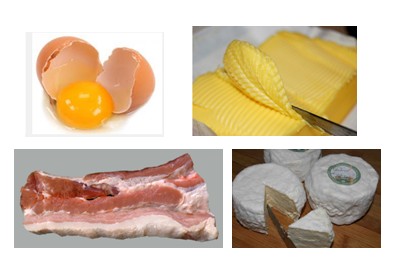Saturated Fat and Cholesterol are good for you

The biggest myth surviving in the world of nutrition is probably that foods rich in saturated fat and/or cholesterol are bad for you. This myth stems from the 1950’s, when Ancel Keys published a study linking saturated fats to high cholesterol and heart disease. Although the study turned out to be severely flawed afterwards, it has ever since been the basis for a food advice demonizing traditional saturated fats (e.g. lard, butter, cream, coconut oil) and pushing new (industry-created, refined, hydrogenated) unsaturated fats (e.g. margarine, vegetable oils)from (highly subsidized) plants such as sunflower, corn, canola or soy, as well as “low-fat” products full of refined sugars and artificial sweeteners. Interestingly enough the incidence of heart disease and obesity has sky rocketed ever since…
The truth is that our body needs saturated fat and cholesterol for many important functions:
- Cell membranes: Consist >50% of saturated fats and cholesterol, which provide stiffness and stability.
- Organs: Saturated fats protect the liver and are the preferred food of the heart. The human brain consists mainly of saturated fat and cholesterol. Human breast milk (considered the “perfect” food) consists to >50% of saturated fat and cholesterol (both crucial for the baby’s growth and brain development)!
- Immune system: Saturated fats have anti-microbial properties and help assimilate proteins (anti-bodies are proteins).
- Hormone production & regulation: Saturated fats help stabilize insulin and cortisol and transport vitamin A (the “real” one), D, E & K, all crucial for a balanced hormone system. Cholesterol is a precursor to vitamin D (important for thyroid function) and sex hormones (fertility)! It is also needed for a proper functioning of the serotonin (feel-good hormone) receptors. Vit A, vit D and cholesterol are ONLY contained in saturated animal fats.
- Energy production: Short and medium chain fatty acids contained in butter and coconut go to the liver directly, providing quick energy, almost like a carbohydrate, but without the negative effects on blood sugar.
- Digestion: Bile salts are made out of cholesterol and the health of the intestinal wall depends on it, too. Enzymes (which digest our food) are proteins and saturated fats help assimilate dietary protein.
- Repair function: Cholesterol is a repair substance that helps heal arterial damage. Blaming arterial damage on the presence of cholesterol is like blaming the police men for the crime they are trying to fight.
- Nutrient assimilation (e.g. calcium or protein): Without the fat-soluble « activator » vitamins A, D (found ONLY in animal fats), E & K, other nutrients are not well assimilated. You can eat or supplement all the lean protein or calcium in the world, if you lack the saturated fats, you won’t absorb them (and your body will need to work hard to excrete them unused).
- Weight loss: By being burnt immediately for energy instead of being stored AND by stabilizing hormones and blood sugar, saturated fats can actually help with weight loss.
In fact, saturated animal fats had been used and consumed for billions of years and studies on isolated populations (as can be read for example in Dr. Weston Price’s book Nutrition and Physical Degeneration) still heavily relying on them show how healthy those people usually are…
The causes for the epidemic of heart disease, obesity, diabetes etc. are more likely to be found in:
- The excess consumption of refined and/or rancid vegetable oils, hydrogenated trans fats and refined carbs (sugar, white flour…)
- Mineral deficiencies (esp. magnesium & iodine) causing artery damage
- Deficiencies of vitamins A, C and D
- Deficiencies of antioxidants like vit E and selenium
- Lack of antimicrobial saturated fats
It is important to make sure to consume those fats from organic animals (because most toxins are stored in the fat) that have been pasture-fed (for an ideal omega 6 / omega 3 ratio). Coconut oil and sustainably harvested unrefined palm oil are great plant based sources for saturated fat as well (don’t contain cholesterol and fat-soluble vitamins though)!
Only use saturated fat (ghee, coconut oil, lard, tallow, sustainably harvested palm oil) for cooking since they are the most heat stable and will not oxidize and turn rancid in the process as unsaturated fats easily do.
How much fat, incl. saturated fat is good for you, depends on your Metabolic Type.
